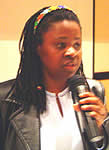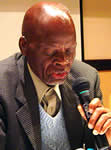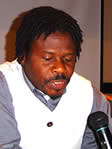|
Back to Index
MISA-Zimbabwe
workshop with Parliamentarians - Victoria Falls July 2004
Kubatana.net
July 19, 2004
Photographs
by Kubatana.net
  Introduction Introduction
The Zimbabwe chapter of the Media Institute of Southern Africa (MISA)
held a one and a half-day media workshop with members of Parliament.
Most of the Parliamentarians present where members of the Portfolio
Committee on Transport and Communications. This workshop was also
a follow up to the last meeting with the Committee held at St Lucia
Park on May 05, 2004
Day
One - July 16, 2004
Reyhana Masters-Smith was scheduled to give the welcome address
but she was not able to attend the workshop. In her place Thomas
Deve (Treasurer of MISA-Zimbabwe) welcomed all present and reiterated
MISA-Zimbabwe's position following negative reports in the
State controlled media. Thomas also introduced the facilitator of
the workshop Rutendo Kambarami (Mwengo).
Review
of last year's workshop and objectives of this year's
workshop
  Sarah
Chiumbu, Director for MISA-Zimbabwe gave a review of the 2003 workshop
in Kariba. She said the 2004 workshop was very productive but there
is a lot of negative developments what have evolved since the last
workshops. These developments include: Sarah
Chiumbu, Director for MISA-Zimbabwe gave a review of the 2003 workshop
in Kariba. She said the 2004 workshop was very productive but there
is a lot of negative developments what have evolved since the last
workshops. These developments include:
- Closure
of the Daily News and the Daily News on Sunday
- Capital
Radio Judgement
- Closure
of the Tribune
- AIPPA amendments
Sarah also highlighted
the major objective of this year's workshop which were:
- Discussing
and sharing ideas around the Zimbabwe Broadcasting Holdings (ZBH)
- Misunderstanding
of issues at ZBC
- Capital Radio
judgements (sections nullified and upheld)
- AIPPA (overview
of highlights of the act)
  Presentation
of reports and challenges made by the Portfolio Committee Presentation
of reports and challenges made by the Portfolio Committee
Silas Mangono (Chairperson of the committee) was not able to attend
the workshop. Hon. Gibson Munyoro read his speech. The Committee's
presentation was mainly to share their experiences in the findings
of the two reports on broadcasting and operations of the Zimbabwe
Broadcasting Holdings (ZBH). The report on Broadcasting was presented
to Parliament on June 09, 2004 and the ZBH report is yet to be finalised
and tabled in Parliament in the next session.
Hon Munyoro
said the Committee's enquiry was guided by four objectives.
These are:
To determine the extent to which ZBH fulfils its mandate as a public
"national" broadcaster; to determine the extent to which
ZBH adheres to the provisions of the Broadcasting Services Act;
to get enlightenment on ZBH policy on programming and to assess
the viability of the company.
Hon. Munyoro
said his Committee had also resolved to establish an Equiry into
Broadcasting Licences a decision that was reached following presentations
by various prospective broadcasters. One of the major issues that
the Committee will be investigating is why no license had been issued,
3 years after the promulgation of the Broadcasting Services Act
(BSA).
Hon. Munyoro
reiterated that their Committee realised the importance of having
Broadcasting Services and media laws that comply with international
standards. Hon Munyoro also said Committees had not had any luck
in dealing with the legislation as it gives more protection to the
Status quo.
Day
2: Session one
The
Electronic Media
  Former
Editor in Chief, ZBC News, Shepherd Mutamba gave a critical
analysis on the restructuring of at ZBC. He also clarified the
difference between criticising something and attacking something.
He said journalists had oftenly been accused of attacking public
office bearers/documents yet in fact they are criticising them. Former
Editor in Chief, ZBC News, Shepherd Mutamba gave a critical
analysis on the restructuring of at ZBC. He also clarified the
difference between criticising something and attacking something.
He said journalists had oftenly been accused of attacking public
office bearers/documents yet in fact they are criticising them.
Shepherd began
by giving his comments on the report presented to Parliament by
the Committee. He said the report was not balanced because it gave
more prominence to the defendant rather than the complainant. He
said most of the people interviewed know where their bread is buttered.
Shepherd said
there was a lack of editorial freedom at ZBC. A board appointed
by the Minister of Information in the Office of the President and
Cabinet ran the ZBC.
In his testimonial
about working at the ZBC, Shepherd said the Government interfered
and controlled the day to day running of station. He said during
his tenure as Editor in chief under the Gideon Gono led Board, there
was a lot of interference in editorial and managerial levels. Issues
like who should anchor news programmes or who should be taken off
air. He said lack of freedom affects the functions of the public
broadcaster.
He further added
that at one stage the Minister of Information reduced himself to
director of news by suggesting what angle the news should take and
giving a particular spin the story should take. Shepherd said he
was disclosing this information so that people can understand government's
interference and its consequences of free floor of information visa
vis the restructuring at ZBH.
Shepherd said
he resigned from the ZBC after serving for a "record"
7 months after refusing to be turned into a professional puppet.
Transmedia
Bucaca Phulu a Bulawayo based legal Practitioner made a presentation
on the operations of Transmedia, which is the signal carrier company
formed after the commercialisation of the ZBC between (2001-2003).
Bucaca during
his presentation that focused on the legal basis of Transmedia said
it was a monopoly created through the back door. Trasnmedia is the
sole signal carrier in the country and no private broadcaster is
allowed to carry out this tack. In his presentation, he said the
irony of it all is that Transmedia is funded by government and has
does not have sufficient funds to meet the ever changing world of
broadcasting, that of reverting from analogue to digital.
Bucaca also
added that the de-monopolisation of the ZBC was not in practice
but in law. Bucaca ended his presentation on highlighting the 3
tier system of Broadcasting namely; public, commercial and community
broadcasting.
Capital
Radio Judgement
Tust Maanda a Legal Practitioner from Mutare gave an analysis of
the Capital Radio judgements. Capital Radio was a Harare based Radio
Station which challenged ZBC's monopoly of being the sole
broadcaster. Capital Radio won a court order to broadcast and they
did, but only for a while.
After the shutting
down of Capital Radio which had broadcast for less than a week,
the state using its emergency powers created the Broadcasting Services
Act (BSA). This Act was meant to regulate the operations of private
broadcasters in Zimbabwe.
In his presentation
Trust said, the BSA affects the freedom of expression. He said the
BSA controls the airwaves and the free-flow of information.
Since the legal
battle by Capital Radio, two sections of the BSA have been struckdown.
These sections are section 6 and Section 9. Section 6 empowered
the Minister to be the licensing authority, while the Broadcasting
Authority of Zimbabwe, processes the applications for licences.
The court struckdown this section because it undermined the independence
of the Broadcasting Authority of Zimbabwe.
Section 9, which
restricted the number of national and television licences to be
awarded, was also struck down. The court found that this section
gave more power to the sate to monopolise the airwaves.
Trust ended
his presentation that although section 6 was repelled it has not
been replaced. A vacuum presently exists, as there is no licensing
authority. What this means it that, if call for applications are
done, there is no person or body that has been approved by the law
to allow the licensing to be done.
Session
Two : Print Media
This session discussed the print media with a critical analysis
on the Access to Information and Protection of Privacy Act (AIPPA).
Wilbert Mandinde,
Acting Advocacy Officer (MISA-Zimbabwe) gave an analysis of the
AIPPA Amendment Bill 2004. He described the Bill as of no significance
to the advancement of freedom of expression. There were three amendments
in this bill. These are analysed below:
Section
2 (amendment to S40)
This section seeks to amend S40 of the Principal Act, which required
some of the members of the Board of the Commission to be appointed
from nominees of an association of journalists and an association
of media houses.
In his analysis
of this section, Wilbert said there was no association of media
houses and this meant there can be no nominee nominated by a non
existing association. He further said the amendment is an admission
by the Minister that the Media and Information Commission is improperly
constituted.
Section
3 (amendment to Section 83)
This section seeks to amend section 83 of the Principal Act, which
prohibits unaccredited or suspended journalists from practising.
Presently there is no penalty provision for some who is found be
practising without accreditation. The proposed amendment will see
those caught on the wrong side of the law being fined $600 000 or
imprisoned for two years or both.
Wilbert argued
"A law without a penalty is no law" and the present
law has no criminal sanctions, hence it can be regarded as non-existent.
He further argued "a custodial sentence for practising a constitutionally
guaranteed right is unheard of, . . . it is too harsh".
Section
4 (amendment to paragraph 4 of the 4th schedule)
Wilbert said this section seeks to provide for the appointment of
an Independent Disciplinary Committee to determine whether any member
of the Commission suspended by the minister should be dismissed.
One of Wilbert's main argument was that the regulation and
conduct of journalists and those involved in the media profession
should be done by themselves, the same way as legal practitioners
and chartered accountants.
How
AIPPA has been used since 2002
Rashweat Mukundu, Research and Information Officer (MISA-Zimbabwe)
made a presentation on how AIPPA has been used since 2002. His presentation
briefly highlighted the arrests of journalists and the closure of
media houses, The Daily News, The Daily news on Sunday and the suspension
of The Tribune. He further described AIPPA as the severest blow
against freedom of the press in Zimbabwe.
Rashweat added
that AIPPA requires journalists to be accredited and the accreditation
must be obtained from the Media and Information Commission (MIC).
As a result of this, four journalists have been arrested and charged
with practising journalism without accreditation. He further said
"journalists who have been accredited still face problems
in accessing certain events and sometimes they are not invited to
state functions or when they are invited security personnel especially
the police have sometimes refused to recognise these cards.
Conclusion
There was an emotionally charged discussion amongst some of the
Parliamentarians. Some of them threatened to walk out of the workshop
because they felt they were being attacked.
The parliamentarians
agreed that it was not easy to summon people before the Committee
especially the Minister of information Professor Moyo. Hon. Giles
Mutsekwa said "it was not easy to summon Prof Moyo, we had
to use every trick in the book". Another parliamentarian said
the Prof Moyo was very defensive with his meeting with the Committee.
"If we had included all he said, it would have filled more
than 500 pages" said another parliamentarian.
During the deliberations
on Prof Moyo's answers to the Committee, the Parliamentarians
said there are reports that Moyo's comments which where recorded
disappeared. Other Parliamentarians said the recorder was not working
well, while some even said they disappeared.
Delegates to
the workshop felt that Shepherd had been courageous to inform them
of what is going on at the ZBC.
  There
was a lot of discussions and debate after each presentation and
delegates felt the workshop was short and more time was needed to
come up with a proper way forward of addressing the media situation
in Zimbabwe. It was generally agreed that MISA-Zimbabwe should try
and seek an audience with the relevant people that stifle media
freedom, especially the Minister of Information and publicity. There
was a lot of discussions and debate after each presentation and
delegates felt the workshop was short and more time was needed to
come up with a proper way forward of addressing the media situation
in Zimbabwe. It was generally agreed that MISA-Zimbabwe should try
and seek an audience with the relevant people that stifle media
freedom, especially the Minister of Information and publicity.
For a long as
meetings will be held and the people who are in a position to enforce
the change of legislation are not present, these meetings will just
be talk shops. It some also agreed that the present problems are
a result of the constitution and until something is done, there
is no practical way forward.
MISA will be
compiling a report on the workshop, which will include the resolutions
that will be taken from the various comments by the people during
the workshop.
Sarah Chiumbu did the vote of thanks. She thanked everyone for their
participation and most importantly thanked the Parliamentarians
from taking time out from their busy schedule (campaigning for the
2005 elections).
Please credit www.kubatana.net if you make use of material from this website.
This work is licensed under a Creative Commons License unless stated otherwise.
TOP
|

